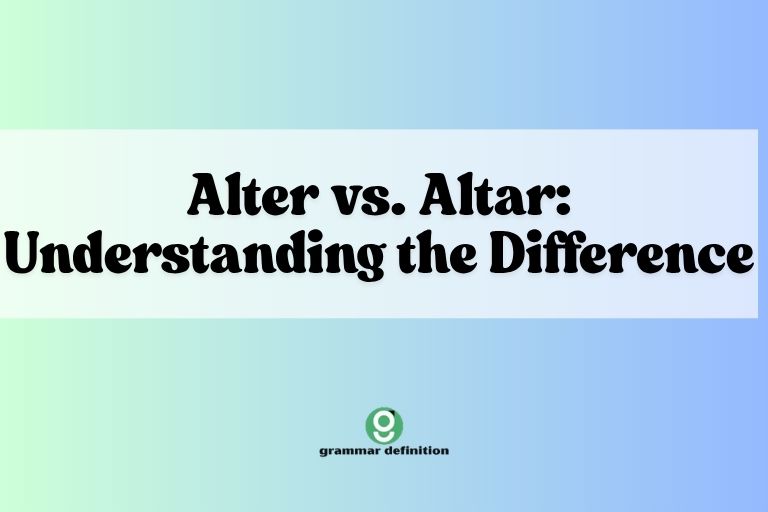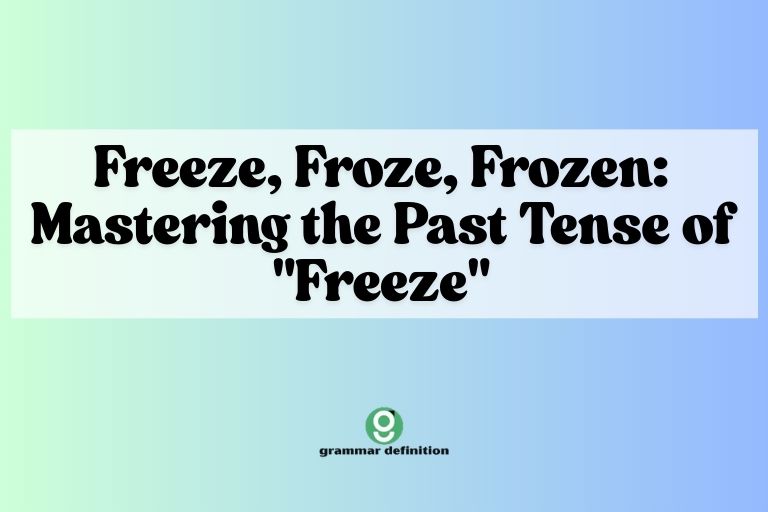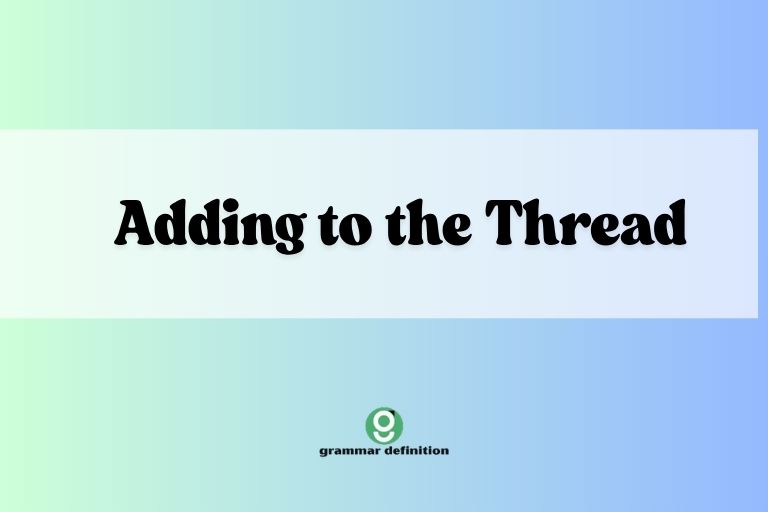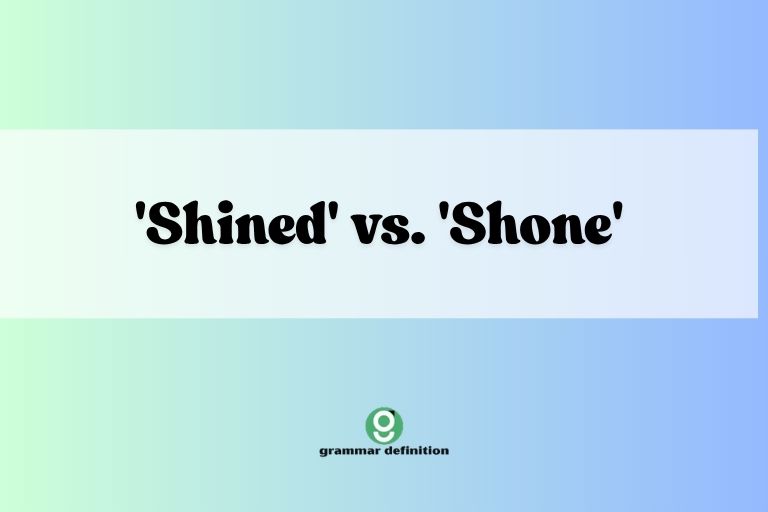Is It Mistook or Mistaken? Understanding the Past Tense of “Mistake”
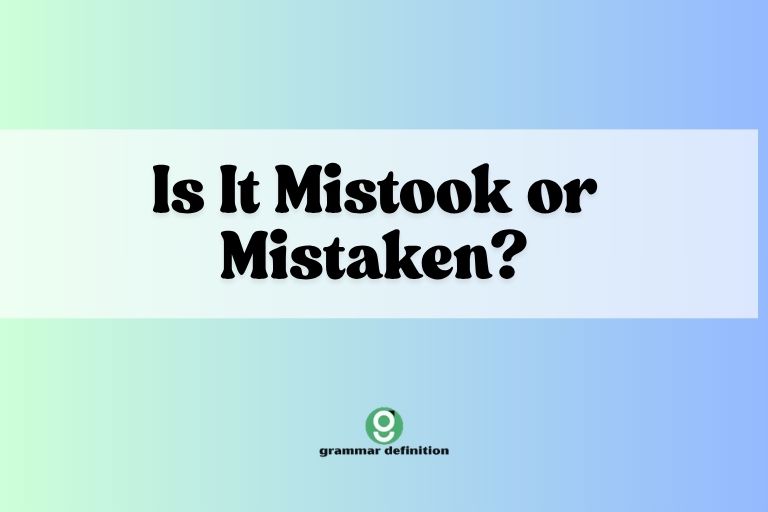
Understanding the correct past tense and past participle forms of verbs is crucial for clear and accurate communication in English. One common point of confusion is the verb “mistake.” Is the past tense “mistook” or “mistaken”?
This article will thoroughly explore the various forms of “mistake,” providing clear definitions, examples, and practice exercises to help you confidently use this verb in your writing and speech. Whether you’re an ESL learner or a native speaker looking to brush up on your grammar, this guide will provide you with the knowledge and tools you need to master the past tense of “mistake.”
Table of Contents
- Introduction
- Definition of “Mistake”
- Structural Breakdown of “Mistake”
- Forms of “Mistake”
- Examples of “Mistake” in Use
- Usage Rules for “Mistake”
- Common Mistakes with “Mistake”
- Practice Exercises
- Advanced Topics: Nuances of “Mistake”
- Frequently Asked Questions (FAQ)
- Conclusion
Definition of “Mistake”
The word “mistake” can function as both a noun and a verb, each with its own distinct meaning and usage. As a noun, a mistake refers to an error or something done incorrectly. It signifies a deviation from what is considered correct, accurate, or appropriate. As a verb, “mistake” means to misunderstand, misinterpret, or wrongly identify something or someone. It implies an act of making an error in perception, judgment, or understanding.
Here’s a more detailed breakdown:
- Noun: An action, decision, or judgment that is wrong or misguided.
- Verb: To be wrong about or to fail to recognize something or someone.
Understanding the dual nature of “mistake” is essential for using its various forms correctly. The context in which the word is used will determine whether it functions as a noun or a verb.
Structural Breakdown of “Mistake”
The verb “mistake” is an irregular verb, which means its past tense and past participle forms do not follow the standard “-ed” ending rule. Instead, it has unique forms that must be memorized.
The base form is “mistake,” the past tense is “mistook,” and the past participle is “mistaken.”
Here’s a table summarizing the forms:
| Form | Example |
|---|---|
| Base Form | Mistake |
| Past Tense | Mistook |
| Past Participle | Mistaken |
| Present Participle | Mistaking |
It’s important to note that the past participle “mistaken” is used with auxiliary verbs like “have,” “has,” “had,” “is,” “are,” “was,” and “were” to form perfect tenses and passive voice constructions.
Forms of “Mistake”
Understanding the different forms of “mistake” is key to using it correctly in various tenses and grammatical constructions. Let’s explore each form in detail:
Base Form: Mistake
The base form, “mistake,” is the infinitive form of the verb and is used in the present tense (except for the third-person singular) and with modal verbs.
Past Tense: Mistook
The past tense, “mistook,” is used to describe actions that happened and were completed in the past. It does not require any auxiliary verbs.
Past Participle: Mistaken
The past participle, “mistaken,” is used with auxiliary verbs to form perfect tenses (e.g., “have mistaken,” “had mistaken”) and in passive voice constructions (e.g., “is mistaken,” “was mistaken”). It can also function as an adjective.
Present Participle: Mistaking
The present participle, “mistaking,” is used in continuous tenses (e.g., “is mistaking,” “was mistaking”) and can also function as a gerund (a verb acting as a noun).
Examples of “Mistake” in Use
To solidify your understanding of the different forms of “mistake,” let’s look at various examples in context.
Examples with the Base Form “Mistake”
The base form “mistake” is used in the simple present tense (except for the third-person singular) and with modal verbs. Below is a table with examples:
| Sentence | Explanation |
|---|---|
| I often mistake him for his brother. | Simple present tense; first-person singular. |
| You must not mistake my kindness for weakness. | Used with the modal verb “must.” |
| They sometimes mistake the meaning of his words. | Simple present tense; third-person plural. |
| We should never mistake assumptions for facts. | Used with the modal verb “should.” |
| I didn’t want to mistake her intentions. | Infinitive form after “want to.” |
| He tries not to mistake the road. | Infinitive form after “tries to.” |
| They might mistake the signs. | Used with the modal verb “might.” |
| We can mistake a friend for a foe. | Used with the modal verb “can.” |
| I will mistake him no more. | Used with the modal verb “will.” |
| You may mistake the path. | Used with the modal verb “may.” |
| They often mistake sarcasm for genuine emotion. | Simple present tense; third-person plural. |
| We must not mistake a coincidence for a pattern. | Used with the modal verb “must.” |
| I didn’t want to mistake their lack of enthusiasm for disapproval. | Infinitive form after “want to.” |
| He tries not to mistake her silence for agreement. | Infinitive form after “tries to.” |
| They might mistake the quiet atmosphere for boredom. | Used with the modal verb “might.” |
| We can mistake a fleeting feeling for a lasting emotion. | Used with the modal verb “can.” |
| I will mistake this feeling no more. | Used with the modal verb “will.” |
| You may mistake the setting sun for the rising moon. | Used with the modal verb “may.” |
| They sometimes mistake simple solutions for complex problems. | Simple present tense; third-person plural. |
| We should never mistake kindness for weakness. | Used with the modal verb “should.” |
Examples with the Past Tense “Mistook”
The past tense “mistook” is used to describe actions that were completed in the past. Here’s a table with examples:
| Sentence | Explanation |
|---|---|
| I mistook him for his twin brother yesterday. | Simple past tense; completed action in the past. |
| She mistook the exit and got lost. | Simple past tense; describing a past event. |
| They mistook the sign and went the wrong way. | Simple past tense; indicating a past error. |
| We mistook his silence for agreement. | Simple past tense; describing a past misunderstanding. |
| He mistook my question for a criticism. | Simple past tense; describing a past misinterpretation. |
| The tourist mistook the local dialect. | Simple past tense; a completed action. |
| I mistook the sound of the wind for someone knocking. | Describing a past misperception. |
| She mistook his nervousness for disinterest. | Describing a past misinterpretation of behavior. |
| They mistook the flashing lights for a party. | Describing a past misidentification. |
| We mistook the abandoned building for a haunted house. | Describing a past mistaken belief. |
| He mistook my hesitation for reluctance to help. | Describing a past misunderstanding of feelings. |
| The traveler mistook the desert mirage for an oasis. | Describing a past misidentification of something seen. |
| I mistook the old photograph for a portrait of my grandmother. | Simple past tense; completed action in the past. |
| She mistook the unfamiliar scent for something unpleasant. | Simple past tense; describing a past event. |
| They mistook the distant music for a live concert. | Simple past tense; indicating a past error. |
| We mistook his polite smile for genuine interest. | Simple past tense; describing a past misunderstanding. |
| He mistook my casual suggestion for a formal request. | Simple past tense; describing a past misinterpretation. |
| The editor mistook the rough draft for the final version. | Simple past tense; a completed action. |
| I mistook the echo for a response. | Describing a past misperception. |
| She mistook his silence for ignorance. | Describing a past misinterpretation of behavior. |
Examples with the Past Participle “Mistaken”
The past participle “mistaken” is used with auxiliary verbs to form perfect tenses and in passive voice constructions. It can also function as an adjective.
Here are some examples:
| Sentence | Explanation |
|---|---|
| I have often been mistaken for my sister. | Present perfect passive; using “been” as an auxiliary. |
| He had mistaken her intentions before. | Past perfect tense; using “had” as an auxiliary. |
| The address was mistaken, so the package was delivered to the wrong house. | Passive voice; using “was” as an auxiliary. |
| She is mistaken if she thinks I will agree. | Present tense passive; using “is” as an auxiliary. |
| Having mistaken the directions, we ended up in the wrong city. | Present perfect participle acting as an adjective. |
| The mistaken identity led to many complications. | “Mistaken” is used as an adjective. |
| I have mistaken the weather for a beautiful summer day. | Present perfect tense; using “have” as an auxiliary. |
| She has mistaken the tone of the conversation. | Present perfect tense; using “has” as an auxiliary. |
| The date had been mistaken on the calendar. | Past perfect passive; using “been” as an auxiliary. |
| He is often mistaken for a celebrity. | Present tense passive; using “is” as an auxiliary. |
| Having mistaken the ingredients, the cake tasted awful. | Present perfect participle acting as an adjective. |
| The mistaken assumption caused the project to fail. | “Mistaken” is used as an adjective. |
| I have been mistaken about the time. | Present perfect passive; using “been” as an auxiliary. |
| She has mistaken his kindness for romantic interest. | Present perfect tense; using “has” as an auxiliary. |
| The information had been mistaken in the report. | Past perfect passive; using “been” as an auxiliary. |
| He is often mistaken for a younger man. | Present tense passive; using “is” as an auxiliary. |
| Having mistaken the rules of the game, we lost. | Present perfect participle acting as an adjective. |
| The mistaken belief led to a lot of confusion. | “Mistaken” is used as an adjective. |
| I have mistaken the purpose of this meeting. | Present perfect tense; using “have” as an auxiliary. |
| She has mistaken his silence for disapproval. | Present perfect tense; using “has” as an auxiliary. |
Examples with the Present Participle “Mistaking”
The present participle, “mistaking,” is used in continuous tenses and can act as a gerund.
| Sentence | Explanation |
|---|---|
| I am mistaking his meaning. | Present continuous tense. |
| She was mistaking the signs. | Past continuous tense. |
| Mistaking his intentions led to a disaster. | “Mistaking” as a gerund (noun). |
| He is mistaking my patience for weakness. | Present continuous tense. |
| They were mistaking my kindness. | Past continuous tense. |
| Mistaking his silence for agreement got her into trouble. | “Mistaking” as a gerund (noun). |
| I am mistaking his smile for a genuine feeling. | Present continuous tense. |
| She was mistaking the path. | Past continuous tense. |
| Mistaking the road for the correct one caused a delay. | “Mistaking” as a gerund (noun). |
| He is mistaking my concern for meddling. | Present continuous tense. |
| They were mistaking my interest as a crush. | Past continuous tense. |
| Mistaking the instructions for the recipe ruined the dish. | “Mistaking” as a gerund (noun). |
| I am mistaking the situation. | Present continuous tense. |
| She was mistaking the map. | Past continuous tense. |
| Mistaking the directions led to a detour. | “Mistaking” as a gerund (noun). |
| He is mistaking my honesty for rudeness. | Present continuous tense. |
| They were mistaking my sincerity for naivety. | Past continuous tense. |
| Mistaking the signal caused an accident. | “Mistaking” as a gerund (noun). |
| I am mistaking the facts. | Present continuous tense. |
| She was mistaking the evidence. | Past continuous tense. |
Usage Rules for “Mistake”
To use “mistake” correctly, you need to follow specific grammatical rules. Here are the key rules to keep in mind:
- Use “mistook” for the simple past tense: This form is used to describe completed actions in the past without any auxiliary verbs.
- Use “mistaken” for perfect tenses and passive voice: This form requires auxiliary verbs such as “have,” “has,” “had,” “is,” “are,” “was,” or “were.”
- “Mistaken” can also be used as an adjective: It modifies nouns to describe something based on an error or misunderstanding.
- Be mindful of the context: Ensure that the tense and form of “mistake” align with the time frame and meaning of your sentence.
Understanding these rules will help you avoid common errors and use “mistake” accurately in your writing and speech.
Common Mistakes with “Mistake”
One of the most common mistakes is using the incorrect past tense or past participle form of “mistake.” Here are some examples of common errors and their corrections:
| Incorrect | Correct | Explanation |
|---|---|---|
| I have mistook him for his brother before. | I have mistaken him for his brother before. | “Mistaken” is the correct past participle form. |
| She mistake the exit. | She mistook the exit. | “Mistook” is the correct past tense form. |
| They are mistake. | They are mistaken. | “Mistaken” is the correct form in the passive voice. |
| He mistaked my kindness for weakness. | He mistook my kindness for weakness. | “Mistook” is the correct past tense form. |
| The address was mistook. | The address was mistaken. | “Mistaken” is the correct past participle form in passive voice. |
| I mistake him. | I mistook him. | “Mistook” is the correct past tense form. |
| She had mistook the plan. | She had mistaken the plan. | “Mistaken” is the correct past participle form. |
| They were mistake about the decision. | They were mistaken about the decision. | “Mistaken” is the correct form in the passive voice. |
| I am mistake. | I am mistaken. | “Mistaken” is the correct form in the passive voice. |
| He mistaked the opportunity. | He mistook the opportunity. | “Mistook” is the correct past tense form. |
By recognizing these common errors, you can improve your accuracy and avoid making these mistakes yourself.
Practice Exercises
Test your understanding of “mistake” with these practice exercises. Fill in the blanks with the correct form of the verb “mistake.”
Exercise 1: Choose the correct form of mistake.
| Question | Answer |
|---|---|
| 1. I often ______ him for his brother. | mistake |
| 2. Yesterday, I ______ him for someone else. | mistook |
| 3. She has often been ______ for her twin. | mistaken |
| 4. He is ______ my silence for agreement. | mistaking |
| 5. They ______ the road and got lost. | mistook |
| 6. We should never ______ kindness for weakness. | mistake |
| 7. The directions were ______, leading to confusion. | mistaken |
| 8. She was ______ the signal. | mistaking |
| 9. They have ______ my intentions. | mistaken |
| 10. I didn’t ______ his purpose. | mistake |
Exercise 2: Rewrite the sentences using the past tense of “mistake.”
- I often mistake her for her sister. (Rewrite in past tense)
Answer: I often mistook her for her sister.
- He tries not to mistake assumptions for facts. (Rewrite in past tense)
Answer: He tried not to mistake assumptions for facts.
- They sometimes mistake sarcasm for genuine emotion. (Rewrite in past tense)
Answer: They sometimes mistook sarcasm for genuine emotion.
- We should never mistake coincidence for pattern. (Rewrite in past tense)
Answer: We should never mistook coincidence for pattern.
- I don’t want to mistake her intentions. (Rewrite in past tense)
Answer: I didn’t want to mistake her intentions.
- I often mistake his kindness for weakness. (Rewrite in past tense)
Answer: I often mistook his kindness for weakness.
- They mistake my concern for meddling. (Rewrite in past tense)
Answer: They mistook my concern for meddling.
- She mistakes my silence for disapproval. (Rewrite in past tense)
Answer: She mistook my silence for disapproval.
- We mistake his smile for a genuine feeling. (Rewrite in past tense)
Answer: We mistook his smile for a genuine feeling.
- He mistakes my honesty for rudeness. (Rewrite in past tense)
Answer: He mistook my honesty for rudeness.
Exercise 3: Fill in the blanks with the correct form of “mistake” (mistake, mistook, mistaken, mistaking).
| Question | Answer |
|---|---|
| 1. I ______ him for his brother last week. | mistook |
| 2. She has been ______ for a celebrity many times. | mistaken |
| 3. They are ______ my kindness for weakness. | mistaking |
| 4. We should not ______ his silence for agreement. | mistake |
| 5. Having ______ the directions, they got lost. | mistaken |
| 6. I often ______ his intentions. | mistake |
| 7. She ______ the exit in the dark. | mistook |
| 8. The information was ______ on the form. | mistaken |
| 9. He is ______ my patience for ignorance. | mistaking |
| 10. They ______ the signal and caused an accident. | mistook |
Advanced Topics: Nuances of “Mistake”
For advanced learners, understanding the subtle nuances and idiomatic uses of “mistake” can further refine your language skills. Consider the following:
- “There’s no mistaking it”: This idiom means that something is undeniable or obvious. For example, “There’s no mistaking it, he’s in love.”
- “Mistake someone for someone else”: This phrase specifically refers to confusing one person for another due to physical resemblance or similar characteristics.
- Using “mistake” in formal writing: In academic or professional contexts, using “mistake” can sometimes be seen as less formal than alternatives like “error,” “oversight,” or “misjudgment.” Choose your words carefully to match the tone of your writing.
Exploring these advanced topics will help you use “mistake” with greater precision and sophistication.
Frequently Asked Questions (FAQ)
Here are some frequently asked questions about the verb “mistake”:
- Is “mistooken” a word?
No, “mistooken” is not a word. The correct past participle of “mistake” is “mistaken.”
- When should I use “mistook” vs. “mistaken”?
Use “mistook” for the simple past tense (e.g., “I mistook him for his brother”). Use “mistaken” as a past participle with auxiliary verbs (e.g., “I have mistaken his intentions”) or as an adjective (e.g., “mistaken identity”).
- Can “mistaken” be used as an adjective?
Yes, “mistaken” can be used as an adjective. For example, “a mistaken assumption” or “a mistaken identity.”
- What is the present participle of “mistake”?
The present participle of “mistake” is “mistaking.” It is used in continuous tenses (e.g., “I am mistaking his meaning”) and as a gerund (e.g., “Mistaking his intentions led to a disaster”).
- How do I avoid confusing “mistake” with other similar words?
Pay attention to the context of the sentence. “Mistake” implies an error in perception, judgment, or understanding. Other words like “error,” “fault,” or “blunder” may have slightly different connotations.
- Is “mistake” a regular or irregular verb?
“Mistake” is an irregular verb because its past tense (“mistook”) and past participle (“mistaken”) do not follow the standard “-ed” ending rule.
- Can you say “I am mistaking?”
Yes, you can say “I am mistaking,” but it is grammatically correct in the present continuous tense and implies that you’re currently in the process of misunderstanding or misinterpreting something. For example, “I am mistaking his intentions if I think he’s being sincere.”
- What are some synonyms for the verb “mistake”?
Some synonyms for the verb “mistake” include: misunderstand, misinterpret, misidentify, confuse, err, blunder, and slip up. The best synonym will depend on the specific context of the sentence.
Conclusion
Mastering the different forms of “mistake” – base form, past tense (“mistook”), and past participle (“mistaken”) – is essential for accurate and effective communication. By understanding the rules and practicing regularly, you can confidently use this verb in various contexts.
Remember to pay attention to the tense and voice of your sentences to ensure that you are using the correct form. With consistent practice, you can avoid common mistakes and use “mistake” with precision and clarity.
Continue to practice with different examples and exercises to reinforce your understanding. Pay attention to how native speakers use “mistake” in their speech and writing.
Over time, you’ll develop a strong command of this verb and be able to use it fluently and accurately. Keep practicing, and you’ll soon find that the correct usage becomes second nature!


